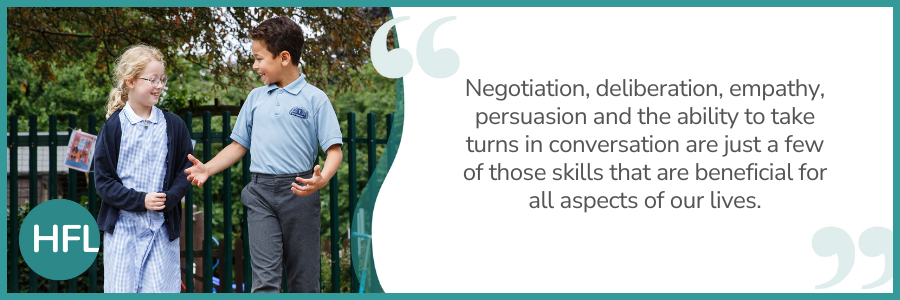
Oracy is a hot topic right now—and for good reason. Strong oracy skills are essential for the development of young thinkers, innovators, and communicators. As more educators and parents recognise its impact, oracy is slowly becoming recognised as a cornerstone of learning, helping children express themselves clearly, listen actively, and engage thoughtfully with others.
For early years and primary aged children, oracy education is especially crucial. It forms the foundation of their social and cognitive development, shaping the way they understand the world and interact with others. Through activities that encourage speaking and listening, children develop the confidence to structure their thoughts, share ideas, ask questions, and solve problems collaboratively. It also plays a powerful role in the development of writing. These skills aren't just academic—they play a significant role in building empathy, resilience, and self-awareness, which are key to personal and professional success.
Research shows that children who are supported to develop strong language skills in their earliest years are more likely to succeed in school and work and lead happier lives.
Oracy Education Commission: we need to talk
Released in October 2024, the Oracy Education Commission's report, ‘We need to talk’, underscores the urgent need to prioritise oracy as a foundational element of lifelong success. The Commission have developed a definition of oracy:
‘Oracy is intrinsic to children’s early development, to the testing of thought, to social and emotional well-being, to confidence, agency and the ability to challenge or debate important issues in civil and constructive ways.’
The report advocates for integrating oracy across all subjects, from early childhood, through to higher education, ensuring that learners develop and apply communication skills to deepen their understanding and engage critically with their peers. Schools should implement an effective and engaging oracy curriculum, comprised of:
- Learning to talk, listen and communicate: develop and progress within well-designed subject curricula
- Learning through talk, listening and communication: using dialogue to foster and deepen learning
- Learning about talk, listening and communication: building knowledge of spoken language in its many contexts
Key recommendations:
- Make oracy a core aspect of education from Early Years to Post-16.
- Incorporate oracy into teacher training and development.
- Promote evidence-based approaches to oracy and subject-specific associations.
- Reflect the scope and value of oracy in assessment accountability.
Implications for school leaders and teachers
The report explains that ‘the promise of oracy education is far reaching.’ Oracy has the power to build our self-image, self-esteem and self-efficacy. Negotiation, deliberation, empathy, persuasion and the ability to take turns in conversation are just a few of those skills that are beneficial for all aspects of our lives. Becoming skilled in oracy allows us to participate as critically engaged citizens, who can advocate for ourselves, but also challenge or find common ground – deeply valuable assets in a polarised world.
‘We Need to Talk’ recommends that we treat oracy as the fourth ‘R’ in schools, allowing time for children to grasp this foundational learning. Just as we would with reading, writing and arithmetic, the report suggests that some teacher development time should be dedicated to deepening teacher subject knowledge and pedagogy around oracy, including how we can best understand and support children with SEND or EAL, fostering a universal sense of belonging.
In schools, we must consider how we can provide opportunities for talk from the earliest stages of children’s education, as well as how to weave oracy through the curriculum, to enhance learning as part of an ambitious and well-rounded curriculum which prepares children for our modern world.
Ready to start your oracy journey?
Whether you want to dive into the full Oracy Education Commission report or listen to insightful conversations from the Oracy Commission podcast, there are plenty of resources available to support you over on the Oracy Education Commission website.
HFL Blogs offer up a breadth of reading on both ‘learning through talk’ and ‘learning to talk’. Take a browse of some of our back catalogue, such as:
- Nicky Murphy’s blog from earlier this year, exploring what the Ofsted English education subject report has to say about spoken language
- Jane Andrew’s blog which explores why we might teach oracy.
We at HFL Education also have a range of resources and training to support you on this important journey:
- Spoken language/oracy audit: our audit tool enables English subject leaders and senior leadership teams to assess the current oracy practices within their school.
- Spoken language progression document: these documents take the national curriculum spoken language statutory requirements and provide guidance on the progression of these skills from Years 1 to 6.
- Oracy: learning through talk: a full day of training to support you in developing an engaging, creative and progressive speaking and listening curriculum, where pupils learn to talk and learn effectively through talk.
Join us for the Primary English Conference: "Powerful Pedagogy – Say It, Write It, Read It": this year's conference features leading voices in the field, including Professor Julia Snell, who will share insights on effective oracy practices.


